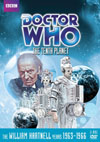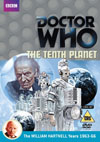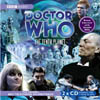The DVD's include:
The VHS Packages include:
This becomes more and more appropriate of course as these four episodes age. December 1986 was twenty years into the future when the story was produced, but now that date really is part of the past. The original script and the novelization change the date to the year 2000. This has also now become the past. The adventure is regarded as a significant "historical" milestone in the program's history with the debut of the Cybermen and the regeneration, so it's wonderful that it contains a script that caters to both of these sentiments. And finally, the "Mondas celestial event" is something that is often referenced in future cyber stories. What better chunk of history could the TARDIS bring the Doctor, his friends, and us viewers to experience?
The Cybermen:The constantly evolving design of the Cybermen on Doctor Who is often regarded as being at its cheapest in this debut story for them, but many of the elements unique to this first design have effective qualities not seen in any other cyber-story. The soft-cloth design of the face does the best job of all, in convincing us that the finished cyberman product is a converted biological humanoid. Also, one of the freakiest touches is the way each cyberman's mouth drops open and hangs opens for the entire duration of each sentence, while Roy Skelton's patchwork assembly of varied tonalities and syllables puts the finishing touches on the synthetic nature of the Cybermen's ability to communicate. Where future Cybermen appear simply to have had their head encased in metal or totally replaced, these Cybermen appear to be masking leprosy or skin cancer or something, while their natural larynx has atrophied or decayed to the point where it has been partially or totally replaced by a primitive mechanical speech box. Gross! This is much more horrific - they cannot speak without sending the chill of being cybernized into those normal humanoids that they intend to "save". The audience is much more tempted to feel the cybernization horror with this design. Future stories need special scenes showing humans becoming cybernized to achieve the same effect, and "Attack of the Cybermen" (story no. 138) is possibly the only other story to really pull it off. That and Star Trek's Borg stories.In terms of Cybermen character, this is also possibly the only story in which they are treated with proper first-contact etiquette. Their culture is explored through dialogue, rather than just cursorily dismissed and fought. They also disguise their intentions benignly, claiming merely a desire to "save" humanity from disaster, although we are given plenty of reason to distrust them from the start, especially as they want to improve humanity by remaking it into their own cyber-image. Ben's initial compassion for the cyberman he is forced to deal with, juxtaposed against Cutler's attitude, makes a very poignant statement about assuming equality and fairness for all, until stronger measures are found to be necessary.
The Ageing Doctor:The guest characters in this story display a tendency to take the limelight and push events forward regardless of the presence of the three time travellers. General Cutler in particular is a very strong screen presence, and Robert Beatty's commanding performance must take much of the credit in making this story such a resounding success. The Doctor does not get a heck of a lot of screen time in this adventure, but thankfully, he is at least adept in making nearly all of his scenes count, imparting wisdom, warnings, strategy, and exploring the characters of the Cybermen. It's a far cry from the pathetic wiener he was in most of "The Dalek Invasion of Earth" (story no. 10, TV version). As in that previous adventure, William Hartnell is again missing for an episode, and again the Doctor faints with his back to the camera to open the episode. However, episode three is not found to be too badly damaged by William Hartnell's absence, as hardly any modifications had to be made to the script to accommodate this. A very reduced role was planned for the Doctor in episode three anyway, highlighting the fact that his great age is finally taking its toll on him and worrying his companions no end. Polly and Ben will not be found to waste any plot time searching aimlessly for him. They can carry on worrying about his ailing condition while he sleeps, bringing this element to the viewers' attention just as the original script had intended them to do. This time around, it is not a lame or poor showing for the Doctor's character, as it is all leading somewhere interesting, deliberately setting the stage for the regeneration. This time around, a weak Doctor is more in character than out. Ben and Barclay cover for the Doctor's dialogue in the one episode-three scene that held any significant need for William Hartnell's presence - Ben now functions as a relay, arguing the Doctor's proposed course of action while still clearly giving him the credit, while Barclay covers the scientific angle which effectively adds outside support for the Doctor's proposal. The plot in episode three is allowed to rocket full steam ahead without Hartnell, while the Doctor's character is given all possible justice. Although this undoubtedly would have been better with William Hartnell present in studio, it is possibly the best missing Doctor episode in existence. All of the cliffhangers in this story are exceptional, however episode three's is the best: one of the most gripping of the entire Hartnell era, further fueling fans' interest in the lost holy grail of missing Doctor Who: the final episode of "The Tenth Planet".The Doctor bounces back for the first half of episode four, and rather effectively he replaces General Cutler's authoritative presence on the base with his own, becoming the humans' commanding line of defense against a much less friendly onslaught of Cybermen. For all their bluster, the Cybermen are actually panicking and becoming more and more desperate, therefore more and more violent. The humans have many advantages in the situation, and no one knows this better than the Doctor himself. It is the Doctor who sets the plans rolling that will resolve the cyberman adventure. However, he is not on hand to deliver the final blows himself. Easily recognized as the human leader, the Doctor is soon a prime candidate to be taken away to the Cybermen's spacecraft, joining Polly as a hostage there. Unfortunately, the Doctor's spirit for exploring does not shine in this new fascinating setting, as his body has pretty much given all it has in the harshly cold ship. No more heroics are to be had from him - he cannot manage to rescue Polly or make any final definitive sacrifice for the safety of his friends or allies. In fact, Ben must go to the trouble to rescue him, after already doing much to lead the execution of the Doctor's plans to thwart the Cybermen, and nicely adding a few touches of his own resourceful thinking. This is sad, but not out of character or off-story. Much of the Doctor and Polly's discomfort is a direct result of the dying Mondas not being able to continue to power the Cybermen's spacecraft and its seldom used heating units. This helps highlight the parallels between the demise of the planet and the demise of the Doctor. And finally we come to the regeneration scene in the TARDIS, the tragic climax of the story and of the series' first three years. The Doctor usually makes his hero's exit with a dematerialization. This time, he does so through death and re-birth, and the moment is much more emotional.
Mutiny on the Barclay:There are some fascinating parallels in this story between General Cutler and the Cybermen, begging the question of which of them would be worse to work under. The first half of the story largely demonstrates their better sides. Cutler is tough and crass, but generally fair, showing he takes the safety of all under his command very seriously. The Cybermen claim they act violently only in self defense, and despite no emotional feeling one way or another, they allow the base crew to make just as good a rescue attempt for their comrades in space as they did under Cutler's command. In the second half of the story, Cutler gains a personal reason for being just as desperate, if not more, than the Cybermen, and his good judgment gives way. Episode four features Cybermen in a similar position, now much closer to the stance that is usually associated with them in later adventures. During this second half, the importance of senior base member Barclay becomes clear, as he is the main local conspirator aiding Ben in organizing a bit of mutiny, firstly against Cutler, later against the Cybermen. The parallels in plot, further emphasized by the similar use of the rocket silo room, make for a chilling comparison. David Dodimead does the role of Barclay justice, emphasizing the thoughtful character and moral dilemma of a man who would rather do his good share without rocking the boat or the chain of command.
Steve Plytas's Wigner, commanding the Geneva set, is a bit bland, helping the plot along when necessary but not generating a heck of a lot of interest in it or in himself. Dyson and the original two astronauts in space also appear to be bland necessities. Meanwhile, the American Sergeant from episode one often goes right over-the-top, sounding both over-eager and patronizing. Episode four's lead Cyberman speaks just as effectively as his episode two counterpart, but episode four also features other speaking Cybermen who sound decidedly more silly thanks to a less than successful attempt to differentiate their speech patterns somewhat. And Robert Beatty's final episode performance does not quite seem up to par with those of previous episodes. Although the regeneration gets a very emotionally effective and mysterious lead-up, it seems to be all over rather suddenly, easily leaving the audience in a state of confusion as to what actually just happened, a question depending on the next episode, also missing, for its answer. There is still much room for improvement in scripting, acting, and directing in this story.
The VHS ReconstructionThe BBC has released all of its surviving material for this classic story on video, including a reconstruction of that lost Holy Grail of missing Doctor Who episodes, number four. The reconstruction is far better than what we got for "The Ice Warriors" (story no. 39) on VHS..... To start with, the entire soundtrack has been used, and not just a select few scenes (which is why this package does NOT include a separate CD). Also, where the telesnap photos and reused stills from previous episodes are not quite enough to make the action understandable, subtitles are scrolled across the bottom of the screen without obscuring any part of the still thanks to an inlay effect. This is much better than the narration present in "The Ice Warriors", and detracts nothing from the mood that "The Tenth Planet" works to convey. The regeneration clip is, of course, included as expected, but the real bonus is the collection of full motion "home movie" style film clips spread throughout the episode. As these generally focus on William Hartnell's best lines, you really can say that you've seen his last performance as the Doctor after seeing this. Hartnell is by far the best element of this last episode, and makes this video a must for true fans of the series. One element I did find to be sorely missing, and it may be missing on the principle of "restoration accuracy", is a credit for Patrick Troughton on episode four! This would have given the regeneration a little more emotional resolution. The episode titles also seem to be less than well thought out, missing one dramatic timing after another, but at least the spelling in the reconstruction is perfect, which is more than one can say for episodes one or three. If the original episode four had any title spelling errors, thanks for fixing them, guys!
DVD AnimationOur options for viewing "The Tenth Planet" are now even greater for DVD, as we get to choose between the old VHS reconstruction included as a bonus, or a newer animated version presented where the "proper" episode should go. Both versions are really good, but their strengths are very different. The animated version is much superior for action sequences and for most scenes in and around the reactor room, where the faces of our human protagonists were obscured with radiation-suit visors and their speaking scenes were mostly concerned with technobabble. These bits are much easier to follow now, and the clarity of the characters' faces improves one's engagement with them as well as improving the tension of the scenes. However, the old VHS reconstruction still reigns supreme when it comes to scenes performed by Robert Beatty or William Hartnell, thanks to the excellent still photos and the treasure trove of full motion clips, and since Hartnell's final performance as Doctor Who is one of the big draws here, there's still a lot to be said in preferring the "VHS" one. Indeed, it almost feels rude to see the first regeneration presented as a cartoon on the DVD's "official" version of the episode, when indeed the actual live-action footage is widely available in high quality. Perhaps the very best option would be a mix-and-match edit, where the best version of each scene, or indeed each shot, could be drawn from either animation, telesnap photo, or full-motion clip. And in that sense, I might well be torn about which version of the cyber-ship interior scenes to use, because both versions have bits that they seem to have done better than their counterpart has. Perhaps such a mix-match edit is too complex to do for every lost episode needing recreation, but "The Tenth Planet, episode 4" is worthy of being the exception to the rule there.
ConclusionsWell, "The Tenth Planet" isn't perfect, but for all its tangible technical problems, it manages somehow to surmount this intangibly. A unique atmosphere surrounds it which Derek Martinus must be given much credit for. Anticipation is a key ingredient that grows stronger and stronger as the story unfolds, and with such major concluding events, it does not disappoint. This is most certainly one of the most powerful classics of the Doctor Who program, with layers of elements containing hidden significance, making repeat viewing quite rewarding. Although technically not part of season three, I tend to regard this story as the true end of William Hartnell's third year, and an adventure that ranks quite high amongst the goodies that season three has offered.
International Titles:Deutsch: (Der zehnte Planet)Magyar: "A tizedik bolygó"Français: (La Dixième Planète)Русский: "Десятая планета"Italiano: "Il decimo pianeta"
"The Tenth Planet" is not known to exist in its original format (4 black-and-white 25-minute TV episodes) in its entirety. The three existing episodes from this story (#1-3) are available on DVD:
Comments on this article are welcome. You may contact the author from this page:
|










